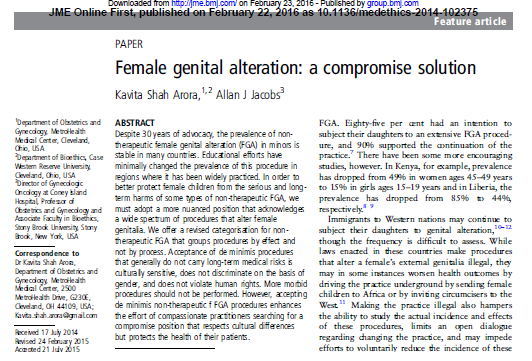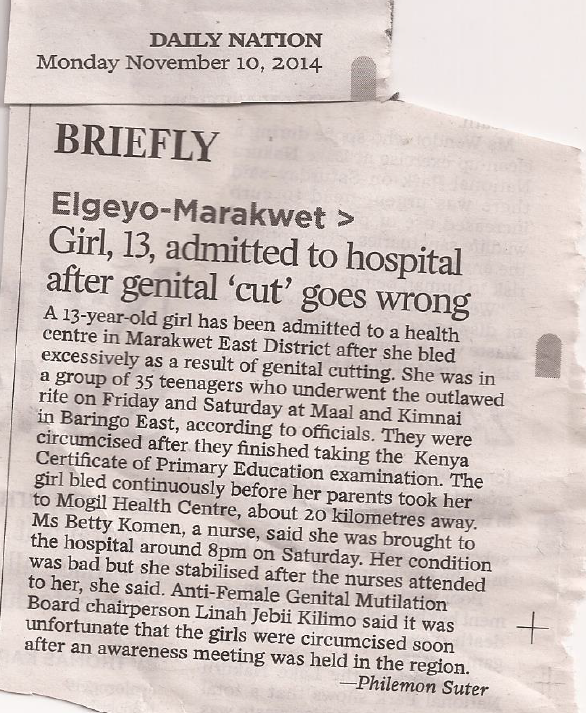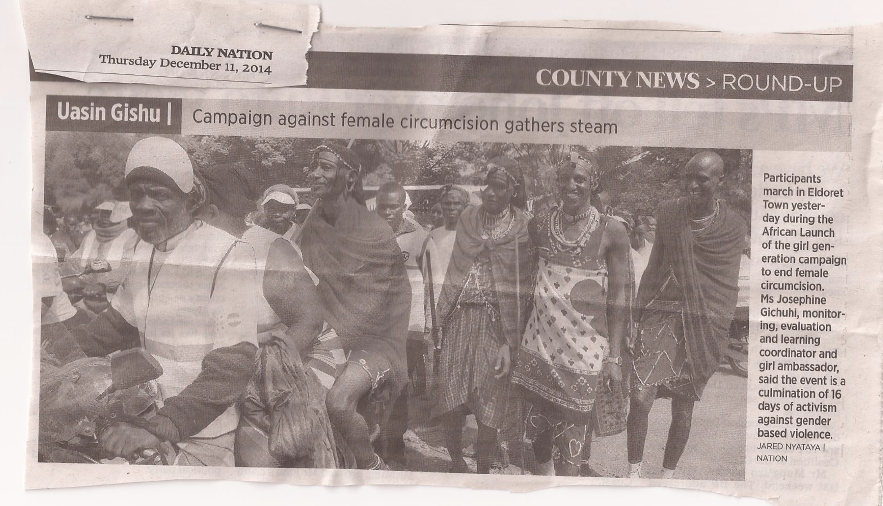
A sideways look at FGM
I doubt that there is anything new I can say about FGM as I have written rather a lot over the years about the topic (check out the footnote).
I believe that criminalising FGM will not eradicate it. Programs that appear to the community to be locally led have some degree of success as has been observed with alternative rites of passage in parts of Kenya. These programs have open discussions, where the community does not perceive that a rite they cherish is perceived as ‘primitive and backward’.
Criminalisation is still however perceived as the best way to end FGM and foreign funded programs are intend on jailing people who practise FGM. Most people are unwilling to take the time to understand why communities hold on to this rite.
Despite the fact that FGM is a criminal offence in the UK, the program Hardtalk a while ago aired a debate in which two women from cultures that practise FGM had completely differing views on the subject….
http://www.bbc.co.uk/programmes/p03f6399
Whether you agree with the women or not – it was a breath of fresh air to see the debate on FGM being discussed by those who bear the burden of it.
A paper published this month (Feb 2016) in BMJ’s Journal of Medical Ethics, has added another voice that has stirred some excitement. The paper was written by Dr Kavita Shah and Dr Allan Jacobs, both gynaecologists in the USA and is titled ‘Female genital alteration: a compromise solution.’
http://jme.bmj.com/content/early/2016/02/21/medethics-2014-102375.short?g=w_jme_ahead_tab
Drs Shah and Jacobs write that criminalising all forms of female genital alteration (FGA) – they refuse to call it mutilation, is not right. They suggest that FGM should be re-defined and those practises that are less invasive should not be criminalised. A small nip, what they call a ‘de minimis’ procedure could be legalised for young girls in order to avoid full scale mutilation and associated health effects. They argue that in the same way that infant male circumcision is considered legal, despite the fact that infant boys are themselves also not able to consent to their own circumcision….
…acceptance of de minimis procedures that generally do not carry long-term medical risks is culturally sensitive, does not discriminate on the basis of gender, and does not violate human rights.
Although their idea sounds theoretical, they give an example in the paper of a group in the USA that attempted to try this out……
In 1996, physicians at Harborview Medical Center in Seattle, (USA) which served a large Somali population, after much deliberation, decided to offer a ritual nick under analgesia to adolescent girls able to assent to the procedure. This compromise was reached in partnership with the Somali patient population with the knowledge that if the alternative and safe procedure would not be able to be performed in the USA, the women would take their female children back to Somalia for a more extensive, likely Category 4 procedure.
The Somali community had agreed to this procedure as an alternative to the usual severe mutilation that little girls undergo. But the program did not even get a chance to mature….
The media and public outcry of utter condemnation led Harborview to end the compromise.
I wonder whether if this practise had taken off, if more Somali communities would have accepted it, leading to less mutilation of little girls and perhaps a slow end to the practice.
Back to the paper…..
The two gynaecologists have been heavily criticised for their suggestion, but there have been other voices added to the debate…..
http://blogs.bmj.com/medical-ethics/2016/02/02/controversial-views-on-fgm/?trendmd-shared=0
I am just pleased to see the debate take a new turn –I think this is the way to a solution. I do not personally advocate for FGM of FGA. No way would I have even the tiniest part of my daughter’s bits cut off – my mother protected my bits and I will protect hers. However, those who cut, have not stopped cutting – criminalising the practise has not stopped it. I have no idea whether this idea would bring FGM down – however, when you keep doing something that does not work, perhaps its time for change, to experiment with an unknown that may just change things……
We need to think outside the box because perhaps that is where a lasting solution lies. Do have a read of the paper and let me know what you think…..
Footnote: Links to previous blogs on FGM on this blog….
http://healthkenya.co.ke/trying-to-end-fgm-in-the-uk-its-hard/
http://healthkenya.co.ke/christmas-circumcision-season-part-ii/
http://healthkenya.co.ke/christmas-its-the-season-the-circumcision-season/
http://healthkenya.co.ke/fighting-fgm-part-ii/
http://healthkenya.co.ke/fighting-fgm-part-1/



